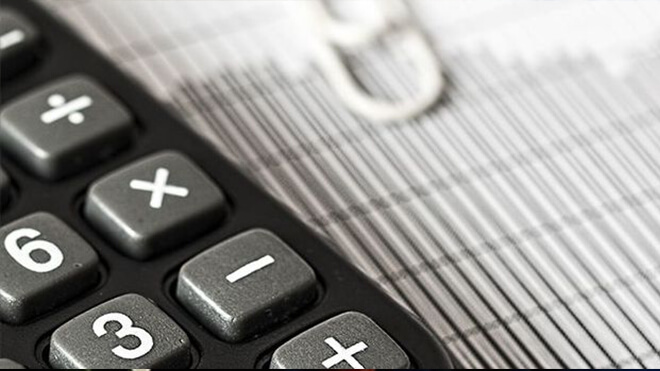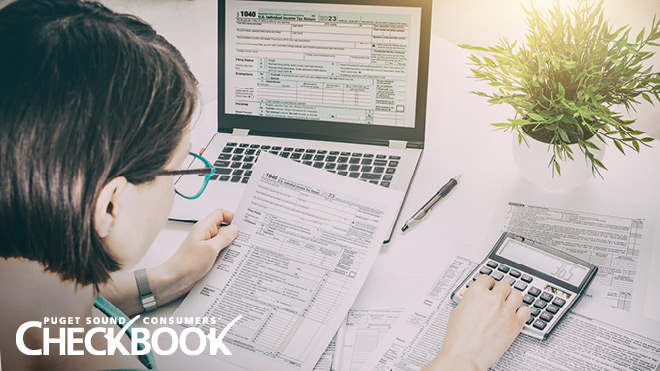
2022 Income Taxes: What You Need To Know
Many pandemic-related stimulus payments and expanded tax credits expired in 2022, which means smaller refunds and higher tax bills are affecting many taxpayers in 2023. Learn the details from Herb Weisbaum and Consumers' Checkbook.
Editor's note: The following post is about filing federal tax returns for the 2022 tax year. If you're looking for information about how to file your taxes in 2024, check out 2023 Income Taxes: What You Need To Know.
Millions of Americans might be disappointed to learn that they'll likely get less money back than last year — or even owe money — as they prepare their federal tax returns for 2022.
"The refunds this year should move back to pre-pandemic levels," said Matthew Frankel, a certified financial planner based in South Carolina who writes for The Motley Fool. "Some people may be surprised that they actually owe money, when they expected to get a few thousand dollars back."
The average refund for last tax season (for returns that were due in April 2022) was $3,293, which was 14% higher than for 2021. A big chunk of that increase was the result of pandemic-related stimulus payments and expanded tax credits, but these temporary benefits have expired.
"Throughout the pandemic, we saw a huge expansion of tax benefits for families with children, and that has all gone away now," said Erica York, senior economist with the non-profit Tax Foundation.
The IRS website has detailed info on deductions and credits.
Here are a few key tax law changes that may negatively affect your refund:
- Child Tax Credit: Now $2,000 per child, down from $3,600 per child last year.
- Child and Dependent Care Credit: Now $2,100 per family, down from $8,000 per family.
- Earned Income Tax Credit (for eligible taxpayers with no eligible children): Those who received roughly $1,500 last year will get $560 this year.
- Charitable deductions: Those who take the standard deduction (90% of all taxpayers) can no longer deduct charitable contributions. Last year, those who took the standard deduction could still claim charitable deductions for cash contributions of up to $300 for individual filers, $600 for married couples filing joint returns.
One bright note: More people may be eligible for the temporarily expanded Premium Tax Credit, designed to help cover the cost of premiums for health insurance purchased through the Health Insurance Marketplace.
If you purchased a new electric plug-in electric vehicle (EV) in 2022, you might qualify for the Clean Vehicle Credit.
Many people rely on tax refunds as part of their yearly budget. The Tax Foundation recommends preparing your return as soon as possible this year, so you can modify your budget if your refund is smaller than expected, or if you owe. If you owe, you don't have to make any payment until the April 18 filing deadline, which may give you time to save up for it. If you can't afford to pay what you owe by April 18, check if you qualify for an IRS payment plan.
IRS Is Promising Better Customer Service
In announcing the official start of this year's tax season, the IRS said it has taken "additional steps" to improve service. The agency used funding from the Inflation Reduction Act, passed in October 2022, to improve training and hire more telephone assistants and in-person staff. Even so, with call volumes at high levels, your best bet may be to use the free resources available on the IRS website.
Filing Deadline
You have more time to file this year: The deadline for most taxpayers is April 18, 2023.
The extra time is due to April 15, the usual deadline, falling on a Saturday and because Washington, D.C., celebrates Emancipation Day on Monday, April 17. By federal law, holidays observed in D.C. impact tax deadlines for everyone in the country as if it were a federal holiday.
If that's not enough time, be sure to apply for an extension before the deadline.
Filing Tips
Filing electronically with direct deposit is still the fastest and easiest way to file and receive a refund. Paper returns slow down the process. The IRS says "most taxpayers will receive their refund within 21 days" if they file electronically and choose direct deposit and the IRS determines that there are no issues with the return. With direct deposit, you can have your refund sent to a checking or savings account, a prepaid debit card, or a mobile payment app. If you don't get a refund in a timely manner, check the Where's My Refund? page on the IRS website.
If your return includes the Earned Income Tax Credit (EITC) or Additional Child Tax Credit (ACTC), the IRS won't process it before mid-February. Congress mandated the delay to prevent criminals from submitting fraudulent returns trying to claim these credits. By law, the IRS must hold the entire refund, even the portion not associated with the EITC or ACTC. The IRS expects most of these refunds to be available starting Feb. 28 to those who use direct deposit and if the IRS doesn't find any issues with their returns.
Check if You Can File for Free
Individuals or families who earned $73,000 or less in 2022 can prepare and file their returns for free using the IRS Free File program.
This year, seven commercial tax preparation companies are taking part in the program. DO NOT just search for "file my taxes for free" — you could end up on the website of a scammer. Instead, use the links provided by the IRS on its Free File page.
Each tax prep company participating in the program sets its own eligibility rules, based on age, income, and state residency. If you meet a company's requirements, the provider can't charge for preparing and filing your federal tax return.
Some IRS Free File providers do charge a fee to prepare state income tax returns. (Washington residents don't pay state income tax.) Any state tax preparation or non-qualifying fees must be disclosed upfront on the provider's IRS Free File landing page.
Unfortunately, few people take advantage of this free service. During the 2021 filing season, (which covered earnings for the 2020 tax year), only 4% of eligible taxpayers used the program, according to a GAO report. While seven out of 10 taxpayers were eligible to use the service, many used a commercial website outside the program, which may have charged them, the report noted.
Unless they obtain your informed and voluntary consent, IRS Free File providers are prohibited from disclosing or using your information for purposes other than preparing your tax return.
The IRS also offers free basic tax return preparation to qualified individuals through its Volunteer Income Tax Assistance (VITA) and Tax Counseling for the Elderly (TCE) programs. These programs are for those who make $60,000 or less, are 60 years and older, have disabilities, or speak limited English.
MilTax is a free tax resource available for the military community, offered through the Department of Defense. It includes tax preparation and electronic filing software, and personalized support from tax consultants. MilTax is designed to assist with issues involving deployments, combat and training pay, housing, and multi-state filings. Eligible service members and their families can use MilTax to electronically file a federal tax return and up to three state returns for free.
Looking Ahead: Quarterly Payments
Gig workers and others who earn income that is not subject to withholding this year must make estimated tax payments to the IRS. Typically, that's done quarterly. The due dates for 2023 for those quarterly payments are April 18, June 15, Sept. 15, and Jan. 16, 2024.
Need Help?
You'll find a variety of online tools at IRS.gov, as well as information on how to get ready to prepare your tax return.
Its Interactive Tax Assistant provides answers to many common tax questions, such as types of income that are taxable, what expenses can be deducted, and qualifications for tax credits.
Create an IRS Online Account and you can securely access personal tax account information, including balance, payments, and tax records including adjusted gross income.
Changes Ahead for Next Year
To account for inflation, the IRS has adjusted the income thresholds for federal tax brackets for 2023 by about 7%. As a result, many Americans who earn more will stay in the same tax bracket; some could have a lower tax bill next year. The standard deduction will also increase by $1,800 for married couples, $1,400 for heads of households, and $900 for single filers and those married who file separately.
About Consumers' Checkbook
Puget Sound Consumers' Checkbook and Checkbook.org are a nonprofit organization with a mission to educate and help consumers. Checkbook also evaluates local service providers — home improvement contractors, doctors, dentists, veterinarians, stores and more. It is supported by consumers and takes no money from the companies it evaluates. BECU members can sign up for free access to Consumers' Checkbook for one year.
The above article is intended to provide generalized financial information designed to educate a broad segment of the public; it does not give personalized tax, investment, legal, or other business and professional advice. Before taking any action, you should always seek the assistance of a professional who knows your situation for advice on taxes, your investments, the law, or any other business and professional matters that affect you and/or your business.


